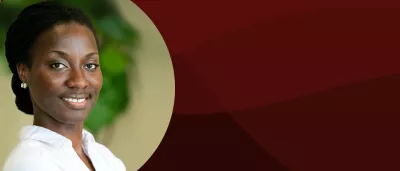IHME: Can you tell me how about how your work connects to IHME’s goal of helping all people live long lives in full health?
Dr. Angela Apeagyei: My work at IHME focuses on tracking financial resources, and as you know, money makes the world go round. I have a particular focus on low- and middle-income countries – so understanding how much donor countries are sending to low- and middle-income countries for health-related activities. I also have some research that focuses on national, that is, low- and middle-income countries’ own spending in their health sectors. For now, that work is focused on specific diseases like HIV/AIDS, immunization, and reproductive health, but the aspiration is to cover more diseases and eventually the entire health resource envelope.
So how does that contribute per se to IHME’s mission of improved health of all people around the world? Money drives a lot of things in the health sector, from [determining] how many health workers there are, to determining how much money there is for equipment, provision of services, and upkeep of infrastructure. What I work on helps clarify whether the financial resources are available. The data we generate can be used in a lot of ways. For example, when you pair spending data with data on the cost of achieving certain health-related goals, you can understand where gaps may be in terms of what is needed financially to achieve certain global health outcomes. Also, you can pair spending data with outcome data to understand efficiency in spending, etc. So making this information available and accessible to the relevant stakeholders contributes to IHME’s mission of improved health of all people around the world.
I came into global health by actively engaging with the options that life presented and following my interests.
IHME: What led you to pursue your current work in global health?
Dr. Angela Apeagyei: Ha! That’s a long story. As they say in Ghana, you will have to see me in chambers for the full details. I will summarize it by saying that I came into global health by actively engaging with the options that life presented and following my interests. While my interest in development issues developed quite quickly once I observed the differences in the living standard abroad when I started college in the US, my particular focus on global health was sealed after about a year working in Ghana with a senior health economist in the World Bank country office.
IHME: How did you end up at IHME?
Dr. Angela Apeagyei: Here is one long story I will tell. When I was getting my PhD, I was one of those “on it” PhD students right out of the door. In my first year in the PhD program, I joined the American Society of Health Economists (ASHEcon), the American affiliate of the International Health Economics Association, a professional society for health economists. I applied and earned a scholarship to attend their annual conference being held in Minnesota that year. As happens at conferences, I reconnected with some of the professionals I met working in Ghana, one of whom, Rose Lavado, had gone on to join the post-graduate program at IHME!
I was good friends with Rose. She was my mentor throughout grad school. She had come to ASHEcon with all of the IHME health financing people. [IHME Associate Professor] Joe [Dieleman] was part of that group. So [when] I connected with Rose at the conference, she introduced me to the IHME team. Fast forward, I’m done with the PhD program, and I check in with Rose to get her input on what next. She had completed her post-doc program by then. I told her that I was deciding what I wanted to do [for my career]. Rose said, “IHME is a great place. If you want to grow, they will challenge you quantitatively, but it’s an intense environment.”
Initially, I sort of shelved [the idea of working at IHME] for a bit because I thought it was far away. I was in New Orleans for graduate school, and I wasn’t necessarily ready for super-intense right out of grad school. Then I did my job search, and it was not yielding anything that I was super excited about. Eventually I went back to look at the IHME job board and saw a position on something called a “resource tracking team.” I reached out to Joe [Dieleman], saying, “I just saw this opportunity on your job board. Do you know who’s doing the hiring?” He said, “You are kidding me. This is on my team. Let’s chat.” And so we did [discuss it]. I had to formally interview for the spot and ended up getting it.
That all panned out really well, and I’m glad I landed where I landed. I love doing what I get to do at IHME.
Moral of the story? You should definitely go to conferences if you’re in grad school. You will find so many connections there.
IHME: What advice do you have for people who are hoping to work in your field?
Dr. Angela Apeagyei: I have one that’s academic-related and one that’s for life in general. For the space we are in, economics, health metrics, you need to be very comfortable around numbers. So, expose yourself to a lot of quantitative things and learn to code if you can.
For life, I think you should be resilient and self-aware. Learning to deal with rejections and navigating differences to find your own path are essential skills to develop in life. Understanding what is your particular value-add or comparative advantage is key. You will need that self-awareness and resilience to be successful in most things.
